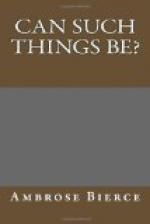Young Halpin was of a dreamy, indolent and rather romantic turn, somewhat more addicted to literature than law, the profession to which he was bred. Among those of his relations who professed the modern faith of heredity it was well understood that in him the character of the late Myron Bayne, a maternal great-grandfather, had revisited the glimpses of the moon—by which orb Bayne had in his lifetime been sufficiently affected to be a poet of no small Colonial distinction. If not specially observed, it was observable that while a Frayser who was not the proud possessor of a sumptuous copy of the ancestral “poetical works” (printed at the family expense, and long ago withdrawn from an inhospitable market) was a rare Frayser indeed, there was an illogical indisposition to honor the great deceased in the person of his spiritual successor. Halpin was pretty generally deprecated as an intellectual black sheep who was likely at any moment to disgrace the flock by bleating in meter. The Tennessee Fraysers were a practical folk—not practical in the popular sense of devotion to sordid pursuits, but having a robust contempt for any qualities unfitting a man for the wholesome vocation of politics.
In justice to young Halpin it should be said that while in him were pretty faithfully reproduced most of the mental and moral characteristics ascribed by history and family tradition to the famous Colonial bard, his succession to the gift and faculty divine was purely inferential. Not only had he never been known to court the muse, but in truth he could not have written correctly a line of verse to save himself from the Killer of the Wise. Still, there was no knowing when the dormant faculty might wake and smite the lyre.
In the meantime the young man was rather a loose fish, anyhow. Between him and his mother was the most perfect sympathy, for secretly the lady was herself a devout disciple of the late and great Myron Bayne, though with the tact so generally and justly admired in her sex (despite the hardy calumniators who insist that it is essentially the same thing as cunning) she had always taken care to conceal her weakness from all eyes but those of him who shared it. Their common guilt in respect of that was an added tie between them. If in Halpin’s youth his mother had “spoiled” him, he had assuredly done his part toward being spoiled. As he grew to such manhood as is attainable by a Southerner who does not care which way elections go the attachment between him and his beautiful mother—whom from early childhood he had called Katy—became yearly stronger and more tender. In these two romantic natures was manifest in a signal way that neglected phenomenon, the dominance of the sexual element in all the relations of life, strengthening, softening, and beautifying even those of consanguinity. The two were nearly inseparable, and by strangers observing their manner were not infrequently mistaken for lovers.




